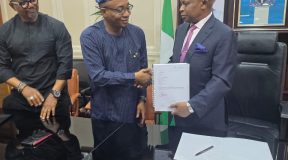The Nigerian National Petroleum Company and the International Monetary Fund (IMF) are squabbling over allegations and denials over the covert reimbursement of petrol subsidies in the nation. The IMF continues to claim that Nigeria will lose nearly half of its anticipated oil earnings this year as a result of the country’s decision to reinstate a petrol subsidy that was removed months earlier.
According to an IMF analysis released on Thursday, the implicit subsidy will cost the nation an estimated N8.43 trillion ($5.9 billion) of its anticipated N17.7 trillion in oil earnings in 2024.
Its projections are in line with those of Bank of America, which estimates that Nigeria might lose $7 billion to $10 billion this year if it imports 18 to 25 billion litres of petrol. Economist for BofA in sub-Saharan Africa Tatonga Rusike stated in a memo.
According to the report, rising crude oil prices are expected to drastically increase Nigeria’s “secret” fuel subsidy bill, endangering the already vulnerable economic standing of the continent’s biggest oil exporter. As of Tuesday, the average price of a barrel of Brent, the standard for Nigerian crude oil, had increased from $77 in January to as high as $86.
The government’s 2024 budget, which has a benchmark price per barrel of $77.96, may benefit from more money due to the higher price of crude oil; but, due to decreased production, the country has not been able to reach its production limits.
An increase in oil prices also means that the Nigerian National Petroleum Company (NNPC) Ltd. is burdened with more petrol subsidies. This is due to the federal government’s mandated lid on the retail price of petrol, which has led to the assumption that the government has started subsidising the good even though the landing cost has long since exceeded the pump price.
The NNPCL, however, views this calculation as a distortion of the facts. “We are making up all of our expenses through the imports of goods. It is imperative to underscore that the subsidy has ceased to exist.
In a letter to correspondent, Olufemi Soneye, Chief Corporate Communications Officer of NNPC Ltd., refuted claims that the petrol subsidy has been restored. However, some sources state that the NNPCL was utilising the money it received from Nigeria LNG dividends to subsidise petrol prices, while other reports state that the business deducts the amount of the subsidies from the money it receives from the sale of Nigerian crude oil before sending the leftover sum to the federation account.
Although the precise amount deducted by NNPCL is still unknown, unofficial data suggests that it may be as much as N17.72 billion every day, which raises questions about transparency. Over N169 billion was used to pay subsidies, according to a report released by the Federation Account Allocation Committee in August of last year. This development highlights the challenges facing the nation.
In December of last year, the World Bank asserted that Nigeria was receiving a partial subsidy and that the price of gasoline at the pump ought to be N750 per litre.




